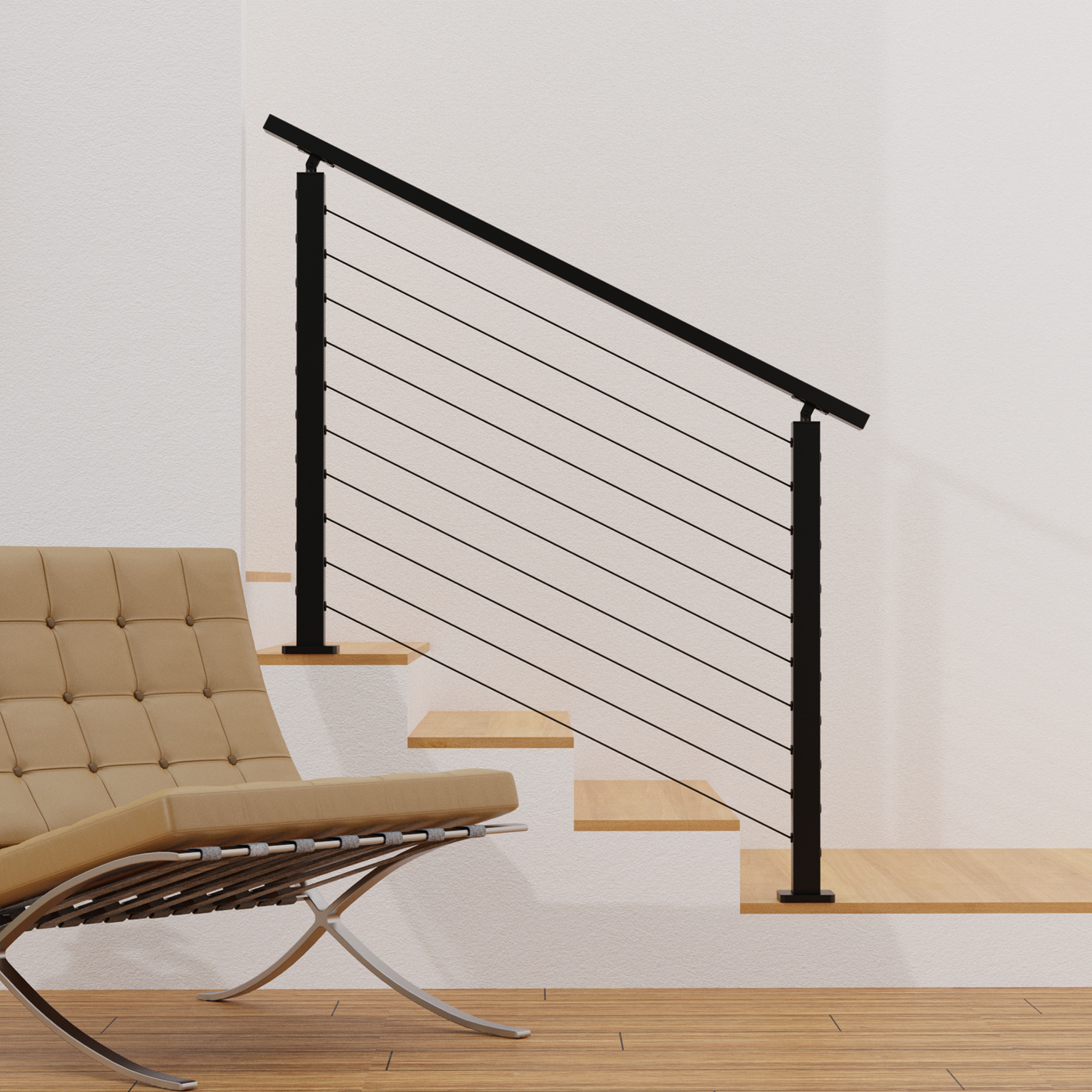Table of Contents
- Introduction
- Average Lifespan of Cable Railings
- Factors That Affect Cable Railing Longevity
- Materials That Extend Lifespan
- Senmit Express Cable Railing System
- Maintenance Tips to Extend Lifespan
- Comparison vs Other Railing Types
- Summary Table
Introduction
When planning for a long-term deck, stairway, or balcony project, a common question arises: how long do cable railings last? Thanks to modern engineering and material advancements, high-quality cable railings like the Senmit 36" 5ft-25ft Black Surface Mount All-in-One Complete Stair Cable Railing System DIY Kit can last for decades with proper care.

Average Lifespan of Cable Railings
On average, well-maintained stainless steel cable railings last between 25 to 50 years. This wide range depends on environmental conditions, material quality, and maintenance. Inferior materials or neglected systems may corrode or become unsafe within 10–15 years, while premium systems can outlast wood or vinyl alternatives.
Expected Lifespan by Material Type:
- 316 stainless steel (marine-grade): 40–50 years
- 304 stainless steel: 25–35 years
- Galvanized steel: 10–20 years
Factors That Affect Cable Railing Longevity
1. Material Grade
The most important factor is the grade of stainless steel used. Marine-grade stainless steel resists corrosion even in coastal or wet climates, while cheaper metals may rust quickly.
2. Environmental Exposure
- Coastal locations: Salt air accelerates corrosion.
- Urban pollution: Acidic rain and pollutants can reduce lifespan.
- Humidity and moisture: Water intrusion without proper drainage can lead to internal rust.
3. Installation Quality
Improper tensioning or inadequate drainage leads to premature wear. A professionally installed or well-designed DIY kit like Senmit’s ensures durability through proper anchoring and layout.
4. Maintenance Frequency
Routine maintenance such as cleaning, lubrication, and checking for tension prevents long-term damage.
Materials That Extend Lifespan
Cable railings made with 316 stainless steel and powder-coated aluminum posts offer superior resistance to environmental wear and tear.
Recommended Materials:
- Stainless Steel Cable (316): Best for saltwater or rainy areas
- Aluminum Posts: Lightweight, rust-proof, and weather-resistant
- UV-Resistant Coatings: Protect surfaces from fading and breakdown
Senmit Express Cable Railing System

The Senmit Express Cable Railing Kit is a premier choice for both DIY homeowners and contractors seeking long-term performance and minimal maintenance.
Key Features of Senmit’s 36" Stair Railing Kit:
- High-Quality Stainless Steel Cables: Includes 1/8" 7×7 black stainless steel cable (100ft spool)
- Durable Aluminum Posts: Powder-coated for rust and weather resistance
- Modular Design: Compatible with lengths from 4′ to 25′
- Complete Kit: Includes cable cutter, angle adjustable brackets, top rail, and installation fittings
Why It Lasts Long:
- Minimal exposed components reduce corrosion risk
- Angle washers and tension kits maintain structural integrity over time
- Invisible stud fittings prevent stress damage and cable wear
Senmit’s dedication to quality and design precision helps homeowners install railing systems that remain functional and attractive for decades.
Maintenance Tips to Extend Lifespan
1. Routine Inspections
- Check cable tension every 6–12 months
- Inspect for rust, loosened fittings, or frayed cables
2. Cleaning Schedule
- Wipe down cables and posts with mild soap and water
- Rinse thoroughly to remove salt or debris
- Avoid abrasive cleaners or steel wool
3. Lubrication
- Use silicone-based lubricant for moving joints or brackets
- Avoid oils that attract dust or degrade plastic parts
4. Protective Measures
- Apply a stainless steel protector for high-exposure areas
- Use post caps to block water ingress into vertical posts
Comparison vs Other Railing Types
Cable vs Wood Railings
- Lifespan: Cable (30–50 years) vs Wood (10–20 years)
- Maintenance: Cable is low-maintenance; wood requires regular sealing or painting
Cable vs Glass Railings
- Durability: Cable more flexible and impact-resistant
- Aesthetics: Glass offers full visibility; cable has a modern minimalist look
- Maintenance: Cable easier to clean, glass shows fingerprints and dirt
Cable vs Iron or Metal Railings
- Corrosion Resistance: Stainless cable fares better than raw or painted iron
- Weight: Cable systems are lightweight and easier to install
Summary Table
| Aspect | Cable Railing (Senmit) | Wood Railing | Glass Railing |
|---|





